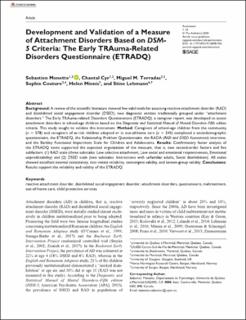| dc.description.abstract | Background:
A review of the scientific literature showed few valid tools for assessing reactive attachment disorder (RAD) and disinhibited social engagement disorder (DSED), two diagnostic entities traditionally grouped under “attachment disorders.” The Early TRAuma-related Disorders Questionnaire (ETRADQ), a caregiver report, was developed to assess attachment disorders in school-age children based on the Diagnostic and Statistical Manual of Mental Disorders–Fifth edition criteria. This study sought to validate this instrument.
Method:
Caregivers of school-age children from the community (n = 578) and caregivers of at-risk children adopted or in out-of-home care (n = 245) completed a sociodemographic questionnaire, the ETRADQ, the Relationship Problem Questionnaire, the RADA (RAD and DSED Assessment) interview, and the Barkley Functional Impairment Scale for Children and Adolescents.
Results:
Confirmatory factor analysis of the ETRADQ items supported the expected organization of the measure, that is, two second-order factors and five subfactors: (1) RAD scale (three subscales: Low selective attachment, Low social and emotional responsiveness, Emotional unpredictability) and (2) DSED scale (two subscales: Interactions with unfamiliar adults, Social disinhibition). All scales showed excellent internal consistency, test–retest reliability, convergent validity, and known-group validity.
Conclusions:
Results support the reliability and validity of the ETRADQ. | |
